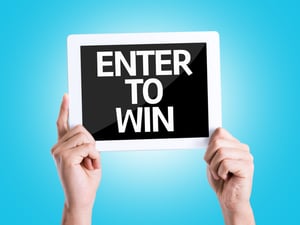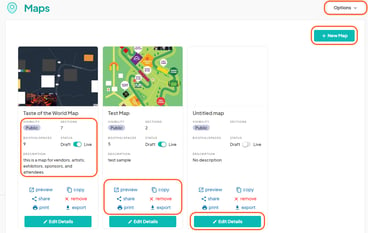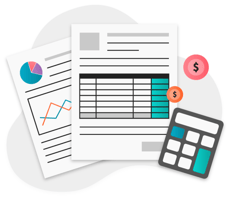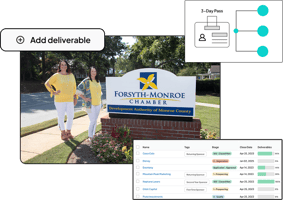When event planning, maximizing return on investment (ROI) is essential for success. Whether you're...
Drive attendance with these 6 creative event promotion ideas
In today's competitive landscape, event promotion is a critical pillar for ensuring the success of any gathering. Driving attendance at events such as conferences, conventions, and more depends on effective marketing strategies. These strategies must capture the audience's interest and encourage their participation.
Table of contents:
What is event marketing?
Event marketing involves a wide range of strategies and platforms designed to promote an event. From traditional methods to innovative digital tactics, it is a crucial tool for engaging potential attendees.
Event marketers can reach their desired audience, generate interest, and increase event participation by utilizing various channels and strategies to keep their audience engaged. They can connect with attendees through social media, email campaigns, and targeted advertising. Different approaches, such as creating engaging content and offering incentives, can also help capture the attention of potential attendees.
By combining these methods, event marketers can create a successful and engaging experience for their target audience.
Understanding event marketing
Event marketing is all about strategically promoting an event to specific audiences to boost attendance and engagement. Its importance lies in its ability to generate excitement, spark interest, and ultimately drive turnout, guaranteeing the event's success and impact.
Importance of effective event marketing in boosting attendance
Effective event marketing is crucial in boosting attendance.
It serves as the primary way of spreading awareness about the event, attracting the attention of potential attendees, and compelling them to participate. Effective marketing strategies drive initial interest and sustain engagement leading to the event, resulting in higher attendance numbers.
Amra Beganovich, influencer and founder of Amra and Elma and Colorful Socks, notes that her team builds excitement early by planning with key figures in mind. “We always start our event promotion well ahead of the actual event as it takes some time to build the excitement. We also begin our planning with key event figures that we want to attend (this can be speakers, influencers, celebrities, etc.), and then share this list in the invitation. It has to be desirable to attend right from the start, and including the list of 'IT' figures increases the appeal and demand for attendance."
In addition to building anticipation, creating a “Wow Factor” can add a memorable, personalized touch. Beganovich shares that at Amra and Elma, they use individual name personalization on everything from gift bags to seating assignments. “We use brand personalization on cakes, drinks, and even seating pillows. This approach made our events with LVMH brands highly 'Instagrammable' and memorable, leaving attendees with a lasting impression.”
This is just one of many ways to drive attendance through different event promotion techniques.
6 creative event promotion ideas
1- Utilizing social media platforms
Social media platforms have become indispensable tools for event promotion due to their wide reach and engagement capabilities. To effectively leverage content marketing, event organizers can employ various strategies:
-
Create captivating visual content: Visuals such as graphics, videos, and images play a crucial role in grabbing the attention of potential attendees. By showcasing event highlights as a form of video content, organizers can create excitement and anticipation among their social media followers.
-
Host live Q&A sessions: Live Q&A sessions provide a unique opportunity for organizers to interact with their audience in
 real-time. By inviting speakers, organizers, or industry experts to participate in these sessions, organizers can address attendees' questions, share insights, and build rapport, ultimately driving engagement and interest in the event.
real-time. By inviting speakers, organizers, or industry experts to participate in these sessions, organizers can address attendees' questions, share insights, and build rapport, ultimately driving engagement and interest in the event. -
Run contests and giveaways: Contests and giveaways are effective strategies for sparking interest and incentivizing engagement on social media. By offering enticing prizes related to the event, organizers can encourage attendees to participate in contests, share event-related content, and spread the word to their networks, thereby increasing the event's visibility and excitement.
2- Leveraging email marketing campaigns
Email marketing remains a powerful tool for reaching potential attendees directly and driving conversions. To make the most of email marketing for event promotion, organizers can implement the following strategies:
-
Segment your audience: Segmenting the audience based on demographics, interests, and past interactions allows organizers to tailor their email campaigns to specific audience segments, delivering more relevant and personalized content that resonates with recipients.
-
Personalize your messages: Making emails feel personal is essential for making people more interested. Using someone's name and talking about things they are interested in can make them feel like you are addressing them personally. This can create a stronger connection and show that you value their interests and opinions. It is essential to personalize your communication to make the recipient feel special and engaged. By mentioning their name and discussing topics that matter to them, you can make your email more impactful and meaningful. This makes the emails more interesting and makes people more likely to read them and click on links inside.
-
Create a sense of urgency: Creating a sense of urgency in email marketing campaigns can prompt recipients to take immediate action, such as registering for the event or securing early bird tickets. By using compelling subject lines, limited-time offers, and clear call-to-action, organizers can encourage recipients to act quickly, increasing conversion rates and driving ticket sales.
-
Provide valuable content: In addition to promotional offers and announcements, organizers can provide valuable content in their email campaigns, such as exclusive sneak peeks, insider tips, and relevant resources. By offering valuable content that addresses the needs and interests of recipients, organizers can establish themselves as trusted authorities and provide added value to recipients, ultimately driving engagement and loyalty.
3- Partnering with influencers and collaborators
Collaborating with influencers, industry leaders, and complementary organizations can significantly amplify an event's reach and credibility. To effectively partner with influencers and collaborators, organizers can consider the following strategies:
-
Identify relevant influencers: Research influencers whose audience aligns with the target demographic and event theme. By partnering with influencers who have a strong following and credibility within the target audience, organizers can leverage their influence to increase visibility and engagement surrounding the event.
-
Offer value to collaborators: Provide influencers and collaborators with incentives such as complimentary tickets, exclusive access, or promotional opportunities in exchange for their support through their social media platforms. By offering value to collaborators, organizers can incentivize their participation and ensure a mutually beneficial partnership that drives results for both parties.
-
Co-create content: Collaborate with influencers and collaborators to create engaging content such as guest blog posts, social media takeovers, and joint promotional campaigns. By co-creating content that resonates with the target audience and aligns with the event's messaging and goals, organizers can leverage the expertise and influence of their partners to increase reach and engagement.
-
Leverage their networks: Use existing networks to reach out to the followers and friends of popular individuals and groups. This will help drive more traffic to the event website and increase sign-ups. Connect with these people to boost attendance at the event. By using the popularity and influence of their partners, organizers can spread the word to more people and attract new folks to the event, which means more people showing up and taking part.
4- Creating engaging content
Compelling content is essential for capturing the attention of potential attendees and conveying the value proposition of the event. Here's how event organizers can create engaging content:
-
Behind-the-scenes sneak peeks: Offer exclusive glimpses into the event planning process, venue setup, and rehearsals to build anticipation and excitement among your audience. By showcasing the behind-the-scenes aspects of your event, you create a sense of insider access and authenticity that resonates with attendees.
-
Speaker spotlights: Highlight key speakers, panelists, and performers through interviews, bios, and teaser videos to showcase their expertise and draw interest. By introducing your speakers and their topics in advance, you give attendees valuable insights into what they can expect from the event and encourage them to register.
-
Attendee testimonials: Share testimonials and success stories from past attendees to illustrate the impact and value of participating in your event. By featuring real-life experiences and testimonials, you provide social proof and reassurance to potential attendees, helping them feel confident in their decision to attend.
-
Interactive experiences: Create interactive content such as quizzes, polls, and interactive maps to engage with your audience and gather feedback. By encouraging participation and interaction, you create a more immersive and personalized experience for attendees, making them feel more connected to your event and more likely to attend.
5- Optimizing your website
To optimize your website for event promotion, it's essential to embed key elements that enhance user experience and increase visibility in search engine results. Here's how organizers can optimize their landing pages with key elements:
Embedding maps:
- Incorporating interactive maps on your event website can enhance user experience and provide valuable information to
 attendees. Embed maps that highlight the event venue, parking options, and points of interest can help attendees navigate the area and plan their visit. On Eventeny, you can embed your maps onto your website by clicking the 'Options' button.
attendees. Embed maps that highlight the event venue, parking options, and points of interest can help attendees navigate the area and plan their visit. On Eventeny, you can embed your maps onto your website by clicking the 'Options' button. - Optimize map content by including relevant keywords such as the event location, venue name, and nearby attractions. This helps search engines understand the context of the map and improve its visibility.
Integrating applications:
- Integrating event applications on your event website can provide attendees with valuable tools and resources to enhance their event experience. Embed links to download event apps directly from your website and provide information on app features, functionality, and benefits.
- Optimize map content by including relevant keywords such as the event location, venue name, and nearby attractions. This helps search engines understand the map's context and improve its visibility.
6- Implementing targeted advertising campaigns
Paid advertising offers a strategic way to target specific demographics, retarget engaged users, and drive conversions. Here's how event organizers can implement targeted advertising campaigns:
-
Define your audience: Identify your target audience's key demographics, interests, and behaviors to create detailed customer personas that inform your advertising strategy. By understanding your audience's preferences and motivations, you can create more targeted and effective advertising campaigns that resonate with your target audience.
-
Choose the right platforms: Select advertising platforms that align with your audience demographics and marketing objectives, whether it's social media advertising on platforms like Facebook and Instagram, search engine advertising on Google, or display advertising on relevant websites and blogs. By choosing the right platforms, you can reach your target audience, where they spend their time online, and maximize the effectiveness of your advertising campaigns.
-
Tailor your messaging: Craft compelling ad copy, visuals, and call-to-action that resonate with your target audience's needs, desires, and pain points. By addressing their specific motivations and concerns, you can create more relevant and persuasive ads that drive engagement and conversions.
-
Monitor and optimize performance: Continuously monitor the performance of your advertising campaigns, analyze key metrics such as click-through rates, conversion rates, and return on ad spend, and make data-driven adjustments to optimize campaign performance and maximize ROI. By tracking and analyzing the effectiveness of your ads, you can identify areas for improvement and refine your advertising strategy to achieve better results over time.
Conclusion
The success of any event hinges upon the effectiveness of its promotion efforts. By implementing these six event promotion strategies, organizers can effectively engage with their target audience, drive attendance, and ensure the success of their events. Each strategy offers unique benefits and opportunities for connecting with potential attendees, so organizers should consider incorporating a mix of these strategies into their overall event promotion strategy for maximum impact.





